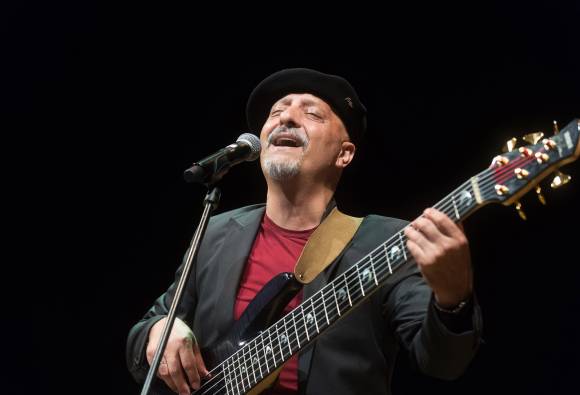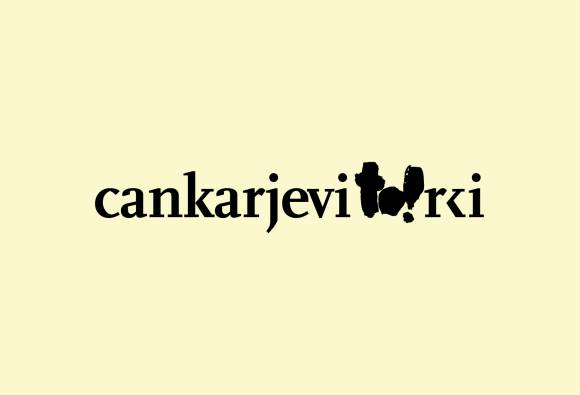
Imer Traja Brizani & Amala
Concert marking the World Day of Romani Language
Armando Brizani, piano, keyboards; Bernardo Brizani, cello; Imer Traja Brizani, vocals, el. bass guitar
Friends: Anja Burnik, flute; Lovro Ravbar, alto saxophone; Uroš Rakovec, acoustic guitar; Neža Drobnič, Miha Vanič, Trinda Haxhiu, vocals; Igor Bezget, guitar; Miha Recelj, drums; Lazaro Amed Hierrezuelo, percussion; Blaž Avsenik, piano
For this concert, Imer Traja Brizani, a synonym for the movement in contemporary Romani music culture, blends the Romani tradition with flamenco and jazz improvisation, as well as the original artistic expressions of the younger and middle generations of musicians. Rooted in the Romani tradition, his powerful music speaks in the language of genuine sincerity, meaningfully enriching the local and international musical creativity. Brizani reinterprets Romani music, known for its temperamental intensity, its rhythmic and improvisational vitality, through his distinctive approach – blending Romani music and jazz to create a unique authorial poetics.
The Priština-born, Slovenian-based (since 1980) multi-instrumentalist, vocalist, arranger, producer and music pedagogue has an MA in musicology. His oeuvre includes more than fifteen albums of original music. He is also the author of the first Slovenian Romani musical, Stekleno jabolko. He began his musical career in Slovenia as a bassist in pop music bands, but his flair for improvisation opened the door for a glittering career in jazz. The jazz greats he has played with range from Jože Privšek to Peter Erskine.
In 1996, he founded Amala, a music group that preserves the rich musical heritage of the Roma people while masterfully combining elements of traditional Romani music with jazz, as well as classical and band music. With Amala, Brizani has performed at numerous jazz and ethno music festivals, both in Slovenia and abroad. He has given solo concerts with the RTV Slovenia Big Band and the RTV Slovenia Symphony Orchestra, and his regular guests – partners in music-making, include many other Romani music performers, both local and international.
Musicologists say that his music is sentimental and passionate, his lyrics in particular being deeply expressive of the destiny and life philosophy of the Romani people. But the Roma say, "Amare gila si dukhade!" (Our songs are songs of pain.)
This is a unique new Romani music, which, musicologically speaking, could be termed as Romani symphonic ethno jazz or the like. While seamlessly integrated, all the seemingly incompatible elements in the music of Imer Brizani, who holds a Master's degree in musicology, retain their own identity and their singular expression, constituting in synergy with each other a musical uniqueness that could only be described as the music of Imer Traja Brizani.
Jani Golob
In 2016, the then President of Slovenia, Borut Pahor, awarded Brizani the Medal of Merit for his creative contribution to the promotion and visibility of Romani culture in Slovenia. "Without tradition, any kind of culture is empty, and poor without innovation and modernity. The Romani people, to whom I belong, are marginalised worldwide. I am trying to set an example to make sure that this is not the case in future, my basic guideline being intercultural dialogue," said Imer Brizani in his acceptance speech. The artist has been striving all his life to enrich Romani culture and build a bridge between tradition and modernity. This is one of the reasons why in the Romani community he has dedicated himself to Romani music education as a pedagogue and mentor.
He has collected and arranged many songs from the world's Romani musical treasury while also composing some himself. He has published the sheet music of the most famous Romani songs he collected in his book Le ostanite, Romi gredo! – a chronicle of the history of the Romani people, their customs, skills, beliefs, tales, poetry and language.
Imer Traja Brizani & Amala
15,00 EUR
10,00 EUR * * EUR for younger than 25 and older than 65, as well as pensioners.



 Cankarjevi torki (Tuesday Clubbing)
" width="580" height="395">
Cankarjevi torki (Tuesday Clubbing)
" width="580" height="395">
